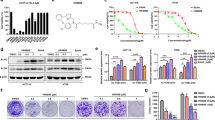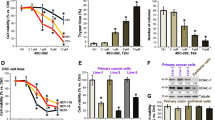Abstract
Purpose
Histone deacetylases (HDACs) have been shown to regulate cell cycle, differentiation, and apoptosis of colorectal cancer (CRC) cells, while their roles in drug sensitivity remain unclear. The objectives of the present study were to investigate the effects of HDAC2 on drug resistance of CRC cells.
Methods
We measured the expression of class I HDACs (HDAC1, 2, 3, 8) in CRC and human normal colonic epithelial cells. Additionally, we inhibited HDAC2 via siRNA or overexpressed it via pcDNA/HDAC2 transfection to evaluate its roles in doxorubicin (Dox) sensitivity.
Results
Our present study showed HDAC2 was significantly increased in CRC cell lines as compared to human normal colonic epithelial cells. Silencing of HDAC2 can obviously enhance the sensitivity of HCT-116 and SW480 cells to dDox. Further, knockdown of HDAC2 can significantly (p < 0.05) downregulate the expression of ABCB1, while not ABCG2, ABCC1, ABCA1, or ABCC2. Inhibition of HDAC2 decreased ABCB1 promoter activities and the phosphorylation of c-fos and c-Jun, which can directly interact with the ABCB1 promoter and then promote its transcription. Overexpression of HDAC2 by pcDNA/HDAC2 transfection significantly increased the sensitivity of CRC cells to Dox and upregulated the levels of P-gp, p-c-fos, and p-c-Jun.
Conclusions
Our data revealed that HDAC2 can regulate Dox sensitivity of CRC cells by targeting ABCB1 transcription. It suggested that HDAC2 might be an important target for CRC therapy. Further, the combination of HDAC2-specific inhibitor and anticancer drugs including Dox might be an efficiency approach to elevate the treatment outcome of CRC.





Similar content being viewed by others
References
Garborg K, Holme O, Loberg M, Kalager M, Adami HO, Bretthauer M (2013) Current status of screening for colorectal cancer. Ann Oncol 24:1963–1972
Torre LA, Bray F, Siegel RL, Ferlay J, Lortet-Tieulent J, Jemal A (2012) Global cancer statistics, 2012. CA Cancer J Clin 65:87–108
Schule S, Dittmar Y, Knosel T et al (2013) Long-term results and prognostic factors after resection of hepatic and pulmonary metastases of colorectal cancer. Int J Colorectal Dis 28:537–545
Nooter K, Stoter G (1996) Molecular mechanisms of multidrug resistance in cancer chemotherapy. Pathol Res Pract 192:768–780
Zhang J, Zhong Q (2014) Histone deacetylase inhibitors and cell death. Cell Mol Life Sci 71:3885–3901
Zhu P, Martin E, Mengwasser J, Schlag P, Janssen KP, Gottlicher M (2004) Induction of HDAC2 expression upon loss of APC in colorectal tumorigenesis. Cancer Cell 5:455–463
Barneda-Zahonero B, Parra M (2012) Histone deacetylases and cancer. Mol Oncol 6:579–589
Kaler P, Sasazuki T, Shirasawa S, Augenlicht L, Klampfer L (2008) HDAC2 deficiency sensitizes colon cancer cells to TNF alpha-induced apoptosis through inhibition of NF-kappa B activity. Exp Cell Res 314:1507–1518
Ashktorab H, Belgrave K, Hosseinkhah F et al (2009) Global histone H4 Acetylation and HDAC2 expression in colon adenoma and carcinoma. Dig Dis Sci 54:2109–2117
Lee YH, Seo D, Choi KJ et al (2014) Antitumor effects in hepatocarcinoma of isoform-selective inhibition of HDAC2. Cancer Res 74:4752–4761
Noh JH, Bae HJ, Eun JW et al (2014) HDAC2 provides a critical support to malignant progression of hepatocellular carcinoma through feedback control of mTORC1 and AKT. Cancer Res 74:1728–1738
Jung KH, Noh JH, Kim JK et al (2012) HDAC2 overexpression confers oncogenic potential to human lung cancer cells by deregulating expression of apoptosis and cell cycle proteins. J Cell Biochem 113:2167–2177
Colombo V, Lupi M, Falcetta F, Forestieri D, D’Incalci M, Ubezio P (2011) Chemotherapeutic activity of silymarin combined with doxorubicin or paclitaxel in sensitive and multidrug-resistant colon cancer cells. Cancer Chemother Pharmacol 67:369–379
Yang F, Teves SS, Kemp CJ, Henikoff S (2014) Doxorubicin, DNA torsion, and chromatin dynamics. Biochim Biophys Acta 1845:84–89
Lee CC, Gillies ER, Fox ME et al (2006) A single dose of doxorubicin-functionalized bow-tie dendrimer cures mice bearing C-26 colon carcinomas. Proc Natl Acad Sci 103:16649–16654
Li M, Tang Z, Zhang D et al (2015) Doxorubicin-loaded polysaccharide nanoparticles suppress the growth of murine colorectal carcinoma and inhibit the metastasis of murine mammary carcinoma in rodent models. Biomaterials 51:161–172
Gottesman MM, Fojo T, Bates SE (2002) Multidrug resistance in cancer: role of ATP-dependent transporters. Nat Rev Cancer 2:48–58
Cowin PA, George J, Fereday S et al (2012) LRP1B deletion in high-grade serous ovarian cancers is associated with acquired chemotherapy resistance to liposomal doxorubicin. Cancer Res 72:4060–4073
Doublier S, Belisario DC, Polimeni M et al (2012) HIF-1 activation induces doxorubicin resistance in MCF7 3-D spheroids via P-glycoprotein expression: a potential model of the chemoresistance of invasive micropapillary carcinoma of the breast. BMC Cancer 12:4. doi:10.1186/1471-2407-12-4
Meidhof S, Brabletz S, Lehmann W et al (2015) ZEB1-associated drug resistance in cancer cells is reversed by the class I HDAC inhibitor mocetinostat. EMBO Mol Med 7:831–847
Tsai YT, Lozanski G, Lehman A et al (2015) BRAF induces ABCB1/P-glycoprotein expression and drug resistance in B-cells via AP-1 activation. Leuk Res 15:30371–30374
Sissung TM, Baum CE, Kirkland CT, Gao R, Gardner ER, Figg WD (2010) Pharmacogenetics of membrane transporters: an update on current approaches. Mol Biotechnol 44:152–167
Wang Y, Zhang D, Wu K, Zhao Q, Nie Y, Fan D (2014) Long noncoding RNA MRUL promotes ABCB1 expression in multidrug-resistant gastric cancer cell sublines. Mol Cell Biol 34:3182–3193
Rodrigues AC, Curi R, Hirata MH, Hirata RD (2009) Decreased ABCB1 mRNA expression induced by atorvastatin results from enhanced mRNA degradation in HepG2 cells. Eur J Pharm Sci 37:486–491
Sundseth R, MacDonald G, Ting J, King AC (1997) DNA elements recognizing NF-Y and Sp1 regulate the human multidrug-resistance gene promoter. Mol Pharmacol 51:963–971
Jepsen K, Rosenfeld MG (2002) Biological roles and mechanistic actions of co-repressor complexes. J Cell Sci 115:689–698
Minucci S, Pelicci PG (2006) Histone deacetylase inhibitors and the promise of epigenetic (and more) treatments for cancer. Nat Rev Cancer 6:38–51
Zimmermann S, Kiefer F, Prudenziati M et al (2007) Reduced body size and decreased intestinal tumor rates in HDAC2-mutant mice. Cancer Res 67:9047–9054
Fritsche P, Seidler B, Schuler S et al (2009) HDAC2 mediates therapeutic resistance of pancreatic cancer cells via the BH3-only protein NOXA. Gut 58:1399–1409
Kim MS, Blake M, Baek JH, Kohlhagen G, Pommier Y, Carrier F (2003) Inhibition of histone deacetylase increases cytotoxicity to anticancer drugs targeting DNA. Cancer Res 63:7291–7300
Maiso P, Colado E, Ocio EM et al (2009) The synergy of panobinostat plus doxorubicin in acute myeloid leukemia suggests a role for HDAC inhibitors in the control of DNA repair. Leukemia 23:2265–2274
Catalano MG, Fortunati N, Pugliese M et al (2006) Valproic acid, a histone deacetylase inhibitor, enhances sensitivity to doxorubicin in anaplastic thyroid cancer cells. J Endocrinol 191:465–472
Pan L, Lu J, Wang X et al (2007) Histone deacetylase inhibitor trichostatin a potentiates doxorubicin-induced apoptosis by up-regulating PTEN expression. Cancer 109:1676–1688
Sims JT, Ganguly SS, Bennett H, Friend JW, Tepe J, Plattner R (2013) Imatinib reverses doxorubicin resistance by affecting activation of STAT3-dependent NF-kappaB and HSP27/p38/AKT pathways and by inhibiting ABCB1. PLoS One 8:e55509
Lee WK, Chakraborty PK, Thevenod F (2013) Pituitary homeobox 2 (PITX2) protects renal cancer cell lines against doxorubicin toxicity by transcriptional activation of the multidrug transporter ABCB1. Int J Cancer 133:556–567
Hui RC, Francis RE, Guest SK et al (2008) Doxorubicin activates FOXO3a to induce the expression of multidrug resistance gene ABCB1 (MDR1) in K562 leukemic cells. Mol Cancer Ther 7:670–678
Kuo MT, Liu Z, Wei Y et al (2002) Induction of human MDR1 gene expression by 2-acetylaminofluorene is mediated by effectors of the phosphoinositide 3-kinase pathway that activate NF-kappaB signaling. Oncogene 21:1945–1954
Hatle KM, Neveu W, Dienz O et al (2007) Methylation-controlled J protein promotes c-Jun degradation to prevent ABCB1 transporter expression. Mol Cell Biol 27:2952–2966
Hung TH, Chen CM, Tseng CP et al (2014) FZD1 activates protein kinase C delta-mediated drug-resistance in multidrug-resistant MES-SA/Dx5 cancer cells. Int J Biochem Cell Biol 53:55–65
Hayakawa J, Depatie C, Ohmichi M, Mercola D (2003) The activation of c-Jun NH2-terminal kinase (JNK) by DNA-damaging agents serves to promote drug resistance via activating transcription factor 2 (ATF2)-dependent enhanced DNA repair. J Biol Chem 278:20582–20592
Shi R, Peng H, Yuan X et al (2013) Down-regulation of c-fos by shRNA sensitizes adriamycin-resistant MCF-7/ADR cells to chemotherapeutic agents via P-glycoprotein inhibition and apoptosis augmentation. J Cell Biochem 114:1890–1900
Cripe LD, Gelfanov VM, Smith EA et al (2002) Role for c-jun N-terminal kinase in treatment-refractory acute myeloid leukemia (AML): signaling to multidrug-efflux and hyperproliferation. Leukemia 16:799–812
Ledoux S, Yang R, Friedlander G, Laouari D (2003) Glucose depletion enhances P-glycoprotein expression in hepatoma cells: role of endoplasmic reticulum stress response. Cancer Res 63:7284–7290
Sui H, Fan ZZ, Li Q (2012) Signal transduction pathways and transcriptional mechanisms of ABCB1/Pgp-mediated multiple drug resistance in human cancer cells. J Int Med Res 40:426–435
Acknowledgments
This research was supported by the Zhejiang Provincial Medical and Health Science and Technology Plan (No. 2015KYB217).
Author information
Authors and Affiliations
Corresponding author
Ethics declarations
Conflict of interest
The authors declare no conflict of interest.
Rights and permissions
About this article
Cite this article
Ye, P., Xing, H., Lou, F. et al. Histone deacetylase 2 regulates doxorubicin (Dox) sensitivity of colorectal cancer cells by targeting ABCB1 transcription. Cancer Chemother Pharmacol 77, 613–621 (2016). https://doi.org/10.1007/s00280-016-2979-9
Received:
Accepted:
Published:
Issue Date:
DOI: https://doi.org/10.1007/s00280-016-2979-9




